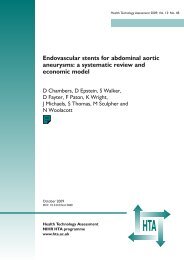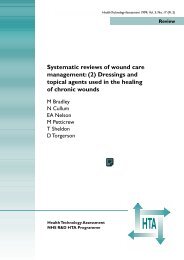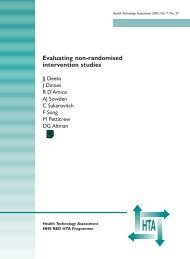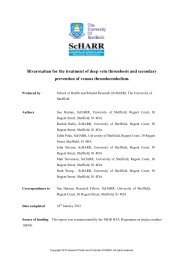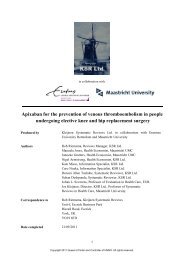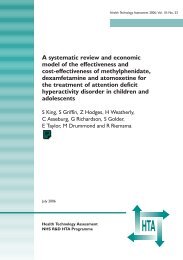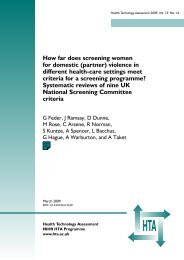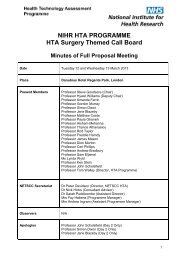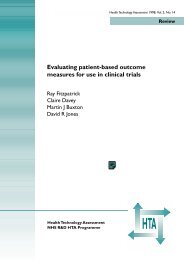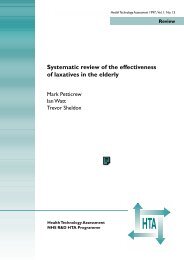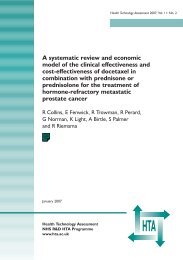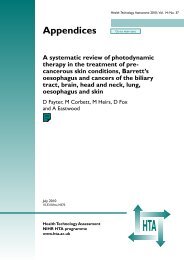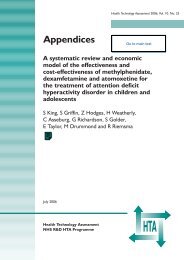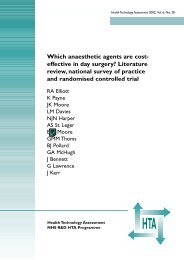Donepezil, rivastigmine, galantamine and memantine for ...
Donepezil, rivastigmine, galantamine and memantine for ...
Donepezil, rivastigmine, galantamine and memantine for ...
Create successful ePaper yourself
Turn your PDF publications into a flip-book with our unique Google optimized e-Paper software.
34<br />
Clinical effectiveness<br />
clinical trials <strong>and</strong> some comparisons can be<br />
made between treatment <strong>and</strong> placebo groups.<br />
● Some adverse events that occur in the short<br />
term <strong>and</strong> that are obvious to participants <strong>and</strong><br />
carers have the potential to unblind participants,<br />
carers <strong>and</strong> physicians, even if trials are placebo<br />
controlled <strong>and</strong> participants are not told which<br />
treatment they are receiving. Such unblinding<br />
could produce biased assessments of treatment<br />
effects when the outcomes are self-assessed.<br />
● Some adverse events may lead to<br />
discontinuation of a participant in a trial or<br />
reduction in the dosage of the treatment. This<br />
has the potential to increase the likelihood of<br />
bias in the reporting of the outcomes.<br />
Various event rates <strong>for</strong> selected adverse events<br />
were reported in 11 of the included trials <strong>and</strong> are<br />
given in Table 10. In general, the quality of<br />
reporting of adverse events is variable <strong>and</strong> is not<br />
consistent across trials, with few descriptions of<br />
how clinical adverse events were defined.<br />
Descriptions of those adverse events that are most<br />
commonly reported between the included trials<br />
are given here. Severity, where noted, is as<br />
reported in each of the individual trials. Very few<br />
included studies made statistical comparisons of<br />
the rates of adverse events in treatment groups<br />
with those in the placebo groups. Table 11 shows<br />
the number of withdrawals due to adverse events.<br />
A range of adverse events were reported in the 11<br />
included studies. One study did not present data<br />
<strong>for</strong> each type of event individually, but rather gave<br />
overall incidence rates. 45 Another, a cross-over<br />
study, only reported adverse events <strong>for</strong> all<br />
participants receiving donepezil treatment. These<br />
studies are not discussed further here but are<br />
reported in Appendix 7. Most events presented in<br />
the studies were reported as mild or moderate in<br />
nature.<br />
Adverse events that were most consistently<br />
reported were generally related to the<br />
gastrointestinal system.<br />
Nausea <strong>and</strong> vomiting<br />
Nausea was reported in seven studies. 41,44,46,47,50–52<br />
Rates of nausea in the donepezil groups ranged<br />
from around 4 to 24% <strong>and</strong> in the placebo groups<br />
from 1 to 9%. Three included studies report that<br />
nausea was statistically significantly greater in<br />
those treated with donepezil than those with<br />
placebo. 46,50,51 Vomiting was reported in five<br />
studies. 41,44,50–52 Rates of vomiting in the<br />
donepezil groups ranged from around 1 to 16%<br />
<strong>and</strong> in the placebo groups from 2 to 5%. Two<br />
included studies report vomiting incidence that<br />
was statistically significantly greater in those<br />
treated with donepezil than in those treated with<br />
placebo, although in both cases this was only with<br />
the higher (10 mg) dose of donepezil. 50,51<br />
Nausea/vomiting was reported in one study, which<br />
also showed the same trend with rates being<br />
higher in the donepezil treated groups compared<br />
to the placebo groups. 53<br />
Diarrhoea<br />
Diarrhoea was reported in seven<br />
studies. 41,44,46,47,50–52 In all studies the incidence of<br />
diarrhoea was greater in the donepezil-treated<br />
groups, although the magnitude of this difference<br />
was less in two studies. 44,47 Three of these seven<br />
studies tested the difference in rates statistically<br />
<strong>and</strong> noted significant differences between the<br />
groups. Rates of diarrhoea ranged from around 4<br />
to 17% in the donepezil groups <strong>and</strong> from 3 to 7%<br />
in the placebo groups.<br />
Other adverse events that were more consistently<br />
reported related to mental <strong>and</strong> neurological<br />
systems.<br />
Headache <strong>and</strong> dizziness<br />
In six of the included studies rates of headache<br />
were reported. 41,44,46,47,52,53 Incidence ranged from<br />
around 3 to 13% in the donepezil-treated groups<br />
<strong>and</strong> around 1 to 9% in the placebo-treated groups.<br />
No studies report statistically significant<br />
differences in the rates of headaches reported<br />
between the groups. Dizziness was reported in six<br />
studies. 41,47,50–53 In all studies the occurrence of<br />
dizziness was greater in the donepezil-treated<br />
groups, although the magnitude of this difference<br />
was generally small.<br />
Agitation/restlessness<br />
Four included studies reported data on<br />
agitation/restlessness. 44,46,52,53 In the donepeziltreated<br />
groups this ranged from 0 to 13% <strong>and</strong> in<br />
the placebo-treated groups from 2 to 10%. In<br />
general, rates within studies were similar between<br />
those in the donepezil-treated group <strong>and</strong> those in<br />
the placebo-treated group. Agitation in<br />
participants may, in particular, have an effect on<br />
the burden on the caregiver; however, in these<br />
studies it would appear that donepezil has a<br />
minimal effect on agitation.<br />
Serious adverse events<br />
Rates of ‘serious’ adverse events were reported in<br />
six studies. 41,43,46,47,50,52 In many cases these were<br />
classed as being unrelated to the study treatment<br />
by assessors; however, in all studies it can be



